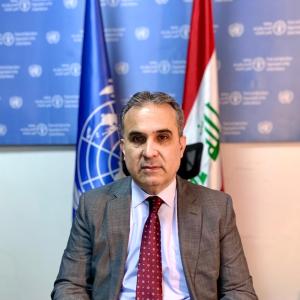New report from FAO, IFAD, WFP and the World Bank reveals complex impact of COVID-19 on food security in Iraq
02 July 2020
As the COVID-19 pandemic continues to evolve, the Food and Agriculture Organization (FAO), International Fund for Agricultural Development (IFAD), World Food Programme (WFP) and the World Bank have collected and analyzed new data on the impact of the crisis on food security, and made corresponding joint recommendations in the first report of a new regular series, “The Impact of COVID-19 on Food Security in Iraq.”
Many people have been unable to work during the current crisis. Around 4.8 million people (12% of the total population) are using negative coping strategies to meet their food needs, and a large stimulus package will be required to re-start the economy, beyond the current measures to mitigate the impact on households and businesses. On the other hand, food availability has been stable overall, with above-average cereal production in the 2019/2020 season, and the government of Iraq taking a proactive role to keep the food system open despite lockdowns. Food imports have continued, with global trade largely uninterrupted.
Humanitarian, social protection and development responses have stepped up, both from the government (such as “Minha” – “Grant”) and supporting partners. However, global trends have had a cascading impact on Iraq. The fall in oil prices and the slow recovery of the global oil market have had negative implications for the domestic budget, and may affect the government’s ability to continue to fund social protection programmes and agriculture subsidies. With assistance from Food Security Cluster partners and the Cash Consortium of Iraq, FAO, IFAD, WFP and the World Bank analyzed food availability and access, with a particular focus on vulnerable populations, and jointly made policy recommendations.
“With initiatives to work towards a regional trade integration framework, create an enabling environment for increasing domestic production, invest in productive infrastructure, enhance social protection and monitor food security, vulnerable households can continue to have access to nutritious food. All possible efforts will be made to support the government of Iraq and implement the proposed recommendations,” said FAO Representative in Iraq Dr Salah El Hajj Hassan, IFAD Representative for Iraq Tarek Ahmed, WFP Iraq Representative Abdirahman Meygag, and World Bank Iraq Representative Ramzi Neman, in a joint statement.
The new publication builds on the partners’ weekly reports on COVID-19 and food security, which launched in April and continue to be released.
Download a copy of the new report at: https://bit.ly/2VDbH3a

He started his career in 1984, as Senior Research Assistant in the Agricultural Research and Education Centre (AREC), American University of Beirut. From 1987 to 1991, he was Coordinator of the Student Training Programme, and also Agriculture and Horticultural Teacher for the Faculty of Agriculture, at the Lebanese University.
From 1991 to 1995, he worked as Agricultural Engineer at the Ministry of Agriculture, Bekaa Regional Office, Zahlah and was then assigned to the Agricultural Research Institute in the Tal Amara station, first as Head of the Crop Production Department and subsequently in charge of the Plant Protection Laboratory. From 2002 to 2006, he was Director of the Kfardane Research Station (Agricultural Research Institute). In 2008, he became Visiting Scientist at the International Maize and Wheat Improvement Centre (CIMMYT) and Coordinator of a project with the International Centre for Atomic Energy Agency, Vienna.
In 2010, he served as Advisor to the Minister for Agriculture of Lebanon. In 2011, he became President of the Pesticide Scientific Committee, Head of the Phytoplasma Committee and Director of the Agriculture and Rural Development Programme (ARDP) (EU-funded project). From 2010 to 2013, he represented Lebanon in negotiations with EU, Egypt, Jordan and Iraq. During his career, Mr Hajj Hassan also carried out a number of other functions. He represented the Lebanese Agricultural Research Institute (LARI) in several research programmes with the International Centre for Agricultural Research in the Dry Areas (ICARDA) and the American University of Beirut. He was Coordinator of the Mashreq/Maghreb project with ICARDA, representing Lebanon in the Steering Committee, as well as being the Head of the Sugar-beet Delivery and of the Wheat Delivery Committees. For a number of years, Mr Hajj Hassan worked for the preparation of FAO TCP projects and served as the National Director of a TCP project. He joined FAO in January 2014 as FAO Representative in Yemen. Mr Hajj Hassan succeeds Mr El Zubi as FAO Representative in Iraq.


